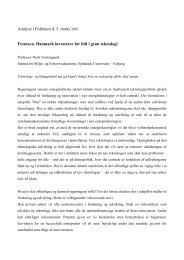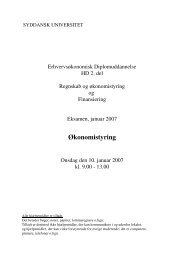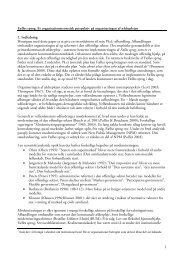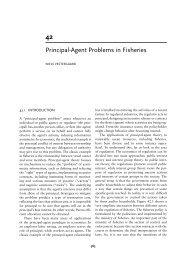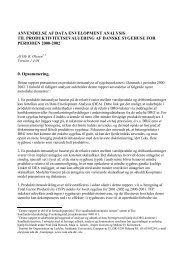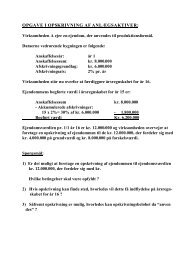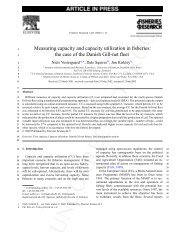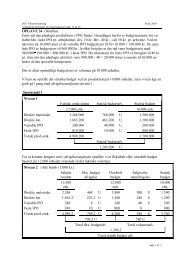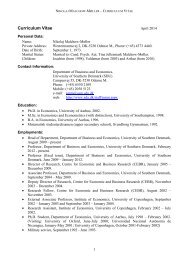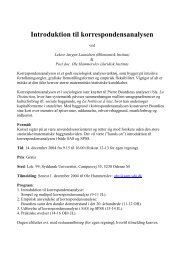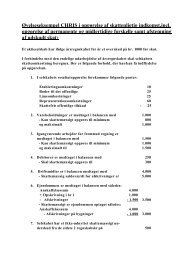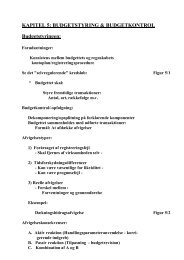<strong>in</strong>dustrial policy. Accord<strong>in</strong>g to the party the import <strong>of</strong> <strong>in</strong>vestment goods took up too little space.Foreign <strong>in</strong>vestments were to a too large extent been concentrated on retail trade <strong>and</strong> simpleproduction. The party also argued <strong>in</strong> favour <strong>of</strong> a more efficiently work<strong>in</strong>g system <strong>of</strong> tax <strong>and</strong> customadm<strong>in</strong>istration <strong>and</strong> collection. Accord<strong>in</strong>g to calculations <strong>of</strong> the party itself the Polish state wasdeprived more than 3 bio. zl. <strong>in</strong> tax <strong>and</strong> custom revenues, more than the state support to polishagriculture pr. year. Due to these factors Polen was <strong>in</strong> a weakened position <strong>in</strong> the <strong>in</strong>ternationalcompetition. In case <strong>of</strong> Polish membership <strong>of</strong> the EU Pol<strong>and</strong> might one-sidedly become a marketfor sale <strong>of</strong> products produced <strong>in</strong> the present EU countries <strong>and</strong> other more competitive marketeconomies.Thus, aim<strong>in</strong>g to protect Polish places <strong>of</strong> work the PSL ma<strong>in</strong>ta<strong>in</strong>ed a rather EU-sceptical l<strong>in</strong>e,especially as regards import <strong>of</strong> EU-subsidized food products. In addition, the party has aimed at<strong>in</strong>creas<strong>in</strong>g the export to the traditional markets <strong>in</strong> the East, especially to Russia <strong>in</strong> return for moreRussian oil <strong>and</strong> gas. Furthermore, the party has put forwards f<strong>in</strong>cially expensive proposals, e.g.writ<strong>in</strong>g <strong>of</strong>f the debt for students after five years employment. In general economic populism hasbeen strik<strong>in</strong>g, but not xenophobic <strong>and</strong> anti-semitic. F<strong>in</strong>ally, among the PSL voters the majorityconsists <strong>of</strong> men. Opposite, the League <strong>of</strong> Polish Families (LPR) mostly appealed to the femalevoters.The defeat at the 1997 election led to “soul-search<strong>in</strong>g” <strong>in</strong>side the party. As said, the election wasfollowed by an <strong>in</strong>ternal split. However, at the 1998 municipal <strong>and</strong> regional elections PSL obta<strong>in</strong>edmore political strength due to the electoral cooperation with the Labour Union (UP) <strong>in</strong> the shape <strong>of</strong>the election alliance “Prymierze Spoleczne”. In the case <strong>of</strong> “Przymierze Polski” were not deal<strong>in</strong>gwith a permanent alliance such as was at least the <strong>in</strong>tention <strong>in</strong> the case <strong>of</strong> SLD <strong>and</strong> AWS. As notedearlier, the alliance between PSL <strong>and</strong> UP can be regarded as tactical, aim<strong>in</strong>g at ga<strong>in</strong><strong>in</strong>g the bestpossible representation <strong>in</strong> local <strong>and</strong> regional councils <strong>and</strong> the greatest possible political <strong>in</strong>fluence.Inside the alliance PSL ga<strong>in</strong>ed the strongest position due to greater party <strong>in</strong>stitutionalisation <strong>and</strong>more political experience amon its leaders.The decision about jo<strong>in</strong><strong>in</strong>g the election alliance with UP (<strong>and</strong> KPEiR, a pensioners party) was takenalmost unanimously, however, without support from the former party chairman Waldemar Pawlak.Accord<strong>in</strong>g to Pawlak, by jo<strong>in</strong><strong>in</strong>g the alliance the Peasants <strong>Party</strong> (PSL) may loose its identity.Accord<strong>in</strong>g to the majority <strong>of</strong> the party leadership that argument was based on the wrong assumptionthat PSL still was a party <strong>in</strong> government <strong>and</strong> strong enough to do everyth<strong>in</strong>g it wanted. Pawlakbecame rather polically isolated <strong>in</strong>side the party, both <strong>in</strong>side the party leadership <strong>and</strong> theparliamentary group. Some observers expressed the op<strong>in</strong>ion that Pawlaks uncompromis<strong>in</strong>g l<strong>in</strong>econcern<strong>in</strong>g coalition build<strong>in</strong>g shall be seen as a wish about a fast political come-back. However, therelatively good election result for the coalition at the 1998 local <strong>and</strong> regional election weakenedPawlak’s position.The decision to cooperate with the Labour Union (UP) was strategical 64 . The alternative tocooperate with the Labour Union (UP) <strong>and</strong> KPEiR was the establishment <strong>of</strong> a “national front”(“blok narodowy”) <strong>in</strong> cooperation with ROP, KPN <strong>and</strong> the people around “Radio Maryja”. Thatsolution was not attractive. Seen from PSL the Labour Union (UP) was <strong>in</strong> possession <strong>of</strong> a strongerorganisation at elections <strong>and</strong> also a more reliable partner than the parties <strong>and</strong> groups on the Rightsuch as ROP, KPN <strong>and</strong> “Radio Maryja”. Opposite the neo-traditionalistic parties UP <strong>and</strong> KPEiRappealed to broad voter groups, mostly workers <strong>and</strong> pensioners. For the same reasons, after the64 Ewa K. Czaczkowska, ”Teraz z lewica”, Rzeczpospolita 8 July, 1998:5.76
local <strong>and</strong> regional elections <strong>in</strong> autumn 1998 UP became the favourite partner for the SLD. Mostimportant was to balance the political strength <strong>of</strong> AWS-UW because <strong>of</strong> the possession <strong>of</strong>governmental power by those parties. PSL’s cooperation with AWS has been modest on all levels,<strong>in</strong> parliament, <strong>in</strong> regions as well as on local level. The Freedom Union (UW) <strong>and</strong> m<strong>in</strong>ister <strong>of</strong>f<strong>in</strong>ance Leszek Balcerowicz was considered as the ma<strong>in</strong> enemy <strong>of</strong> the party. Therefore AWS’cooperation with the liberal Freedom Union (UW) was heavily critisised. At the 1997 election AWShad “stolen” many votes from PSL, now the ma<strong>in</strong> task was to br<strong>in</strong>g those votes back to the party.In the end PSL overcame the crisis. Once more, the slogan that “<strong>in</strong>stitutions do matter” wasconfirmed. Just after the election defeat <strong>in</strong> 1997 there was also talk about focus<strong>in</strong>g more on theelectorate liv<strong>in</strong>g <strong>in</strong> the bigger towns. The risk was a loss <strong>of</strong> votes <strong>in</strong> rural areas. That argumentspoke <strong>in</strong> favour <strong>of</strong> keep<strong>in</strong>g the old policy l<strong>in</strong>e, maybe <strong>in</strong> close cooperation with ideologicallysimilar parties. After the 1997 election defeat also the party organisation was tightened. Thus, seenover the whole period s<strong>in</strong>ce 1989 PSL has been well represented both regionally <strong>and</strong> locally, hasobta<strong>in</strong>ed a solid membership basis with a fairly good school<strong>in</strong>g <strong>of</strong> deputies <strong>and</strong> c<strong>and</strong>idates. Theparty leadership succeeded <strong>in</strong> pr<strong>of</strong>essional ways to conduct election campaigns, e.g. tim<strong>in</strong>g thepress conferences <strong>and</strong> prepar<strong>in</strong>g the election strategies 65 . Unlike under the Pawlak leadership PSLwas no longer governed by a small group <strong>of</strong> experts <strong>and</strong> advisers. In the late 1990’s the partychairman was assisted by more than 20 political <strong>and</strong> economic experts work<strong>in</strong>g much morepr<strong>of</strong>essionally than before.However, after the election defeat <strong>in</strong> 2001 PSL lost several <strong>of</strong> its party members. At the same timethe split between “pragmatists” <strong>and</strong> “nationally orientated” people <strong>in</strong> the party <strong>and</strong> <strong>in</strong>creas<strong>in</strong>gcompetition from Samoobrona to weakened the cohesion on both the leadership <strong>and</strong> parliamentarylevel.As noted above, after the 2001 election the party took the decision to jo<strong>in</strong> the SLD led government,but first after a n<strong>in</strong>e hours long meet<strong>in</strong>g <strong>and</strong> heated debate, where about one fourth <strong>of</strong> the delegatesvoted aga<strong>in</strong>st tak<strong>in</strong>g governmental responsibilities. The majority referred to the too manyconcessions on important policy issues, e.g. PSL’s dem<strong>and</strong>s about low VAT on food products <strong>and</strong>production mach<strong>in</strong>ery, lower <strong>in</strong>fluence to the monetary political council <strong>of</strong> the National Bank,f<strong>in</strong>ancial support to debt hidden Polish banks (PKO, BP, BGK, BGZ) <strong>and</strong> the lower <strong>in</strong>terest rates <strong>in</strong>general. Furthermore, accord<strong>in</strong>g to the critique from PSL, more <strong>in</strong>come to the state fromprivatizations should be used as support for job creation <strong>and</strong> not to cover the deficit on the statebudget. In March 2003 the PSL had to to leave the government due to low vot<strong>in</strong>g discipl<strong>in</strong>e <strong>in</strong>parliament. Be<strong>in</strong>g <strong>in</strong> opposition, a new split emerged <strong>in</strong>side the party concern<strong>in</strong>g the attitude toLeszek Millar’s m<strong>in</strong>ority government <strong>and</strong> enter<strong>in</strong>g alternative anti-governmental coalitions, i.e.cooperation with the Civic Platform (PO), PiS, maybe even “Selfdefence” (Samoobrona). Somemembers <strong>of</strong> the PSL parliamentary group also called for the resignation <strong>of</strong> the then rather pro-SLDparty chairman (Kal<strong>in</strong>owski), reject<strong>in</strong>g the “flirt with liberalsm”. The plan came to reality at the2004 party congress, at wchich Janusz Wojciechowski was elected to the new party Chairman, thusmark<strong>in</strong>g a more “activist” <strong>and</strong> “populist” policy l<strong>in</strong>e, accord<strong>in</strong>g to his opponents signify<strong>in</strong>g the“death <strong>of</strong> the party”. .As noted above, after the 2002 election PSL was to a great extent threatened by Andrzej Lepperspopulist political association Samooobrona (“Selfdefence”), etablished <strong>in</strong> 1993. In the years beforeSamoobrona had organized several road blockades <strong>and</strong> violent protest demonstrations aimed at65 Krzystyna Naszkowska, “Ludowe muskuly”, Polityka no. 12, 20. marts, 1999:27-28.77
- Page 3:
“This provisional situation chara
- Page 6 and 7:
marketisation and privatisationshor
- Page 8 and 9:
purposes, are channels for “expre
- Page 10 and 11:
the significance of strategic choic
- Page 12 and 13:
presidentialism gave rise to “flo
- Page 14 and 15:
antipolitics and reinforcement of a
- Page 16 and 17:
In the late 1990’s elections most
- Page 18 and 19:
determined primarily by “politica
- Page 20 and 21:
politics and antipolitics, all sign
- Page 22 and 23:
which attitudes to state regulation
- Page 24 and 25:
Anti-communism has been defined in
- Page 26 and 27: elections and the Slovak communists
- Page 28 and 29: Cartel agreementsbetter representat
- Page 30 and 31: Basically the absence of clear cons
- Page 32 and 33: After 1989 different types of polit
- Page 34 and 35: complex project for transition unde
- Page 36 and 37: window of opportunity in spite of s
- Page 38 and 39: analyses of party institutionalizat
- Page 40 and 41: political messages and slogans. Thu
- Page 42 and 43: well established party culture may
- Page 44 and 45: expected, much due to the many spli
- Page 46 and 47: Furthermore, the polarisation on el
- Page 48 and 49: Finally, Solidarity can also be con
- Page 50 and 51: whole, on the one side an authorita
- Page 52 and 53: The economic recession and the grav
- Page 54 and 55: election defeat more cooperation an
- Page 56 and 57: The formation of AWS can be conside
- Page 58 and 59: group. RS AWS constituted the Chris
- Page 60 and 61: According to the original plans the
- Page 62 and 63: values. According to Rybicki, as so
- Page 64 and 65: AWS should fight against all types
- Page 66 and 67: 2001 parliamentary election, howeve
- Page 68 and 69: and workers voted ZChN. At the 1993
- Page 70 and 71: The League has been considered as a
- Page 72 and 73: establishment like than LPR’s. Th
- Page 74 and 75: jobs in rural areas, especially sma
- Page 78 and 79: pressurizing the government to give
- Page 80 and 81: democrats, thereby locating itself
- Page 82 and 83: To conclude, the Freedom Union (UW)
- Page 84 and 85: Polish middle class. Thus, in Janua
- Page 86 and 87: such as KSCM and KSS in The Czech R
- Page 88 and 89: The SLD leaders were mainly recruit
- Page 90 and 91: the falling popular support for pri
- Page 92 and 93: innovation was formation of the pol
- Page 94 and 95: place after talks with each applica
- Page 96 and 97: Has the Left any freedom of manoeuv
- Page 98 and 99: medicine, changes in the labour cod
- Page 100 and 101: The Labour Union (UP), Democratic U
- Page 102: Nevertheless, before that had taken



